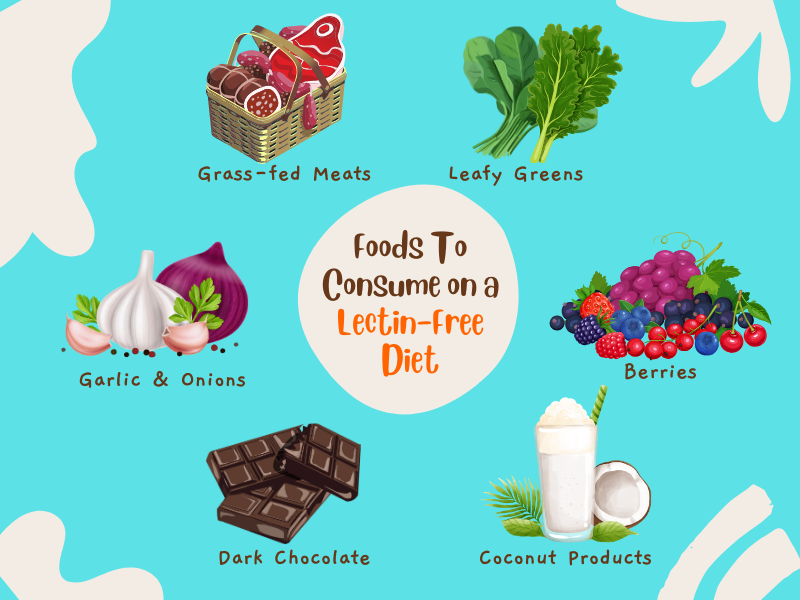




You may be familiar with popular diets like paleo, keto, or Mediterranean diets, but have you heard of the lectin-free diet?
Lectins, a type of protein found in plants, are believed to contribute to digestive discomfort and reduce the absorption of certain nutrients. But do these suspicions hold true, and does removing them from your diet help your body detox? This article will guide you through the essentials of the lectin-free diet and help you determine if it’s right for you. Keep reading to learn more!
What Are Lectins?

Lectins are proteins found in many plant-based foods such as grains, legumes, nightshade vegetables, and some fruits.
You may also like: 5 Plant-Based Chocolate You Need To Try
What Effect Do Lectins Have on Our Bodies?
Lectins bind to carbohydrates and can be difficult to digest in the human digestive system, which is why they are considered “anti-nutrients” [1]. This can hinder the absorption of essential minerals like calcium, iron, phosphorus, and zinc. Lectins can also attach to the cells in the intestines, potentially triggering an autoimmune response [2]. This has led to concerns about their role in autoimmune reactions, contributing to the popularity of diets that avoid high-lectin foods.
Lectins protect plants from insect damage, disease-causing bacteria, and harsh environmental conditions. Overall, the health benefits of consuming lectin-containing foods outweigh the potential harm of lectins in these foods.

What is the Lectin-Free Diet?

The Lectin-free diet, introduced by Dr. Steven Gundry, focuses on reducing or eliminating foods high in lectins, proteins found in many plant-based foods like grains, legumes, nightshades, and some fruits. The diet encourages the consumption of foods that are low in lectins, such as leafy greens, cruciferous vegetables, nuts, seeds, and select meats and fish.
Dr. Gundry and other advocates believe that avoiding lectins can improve digestion, increase energy, and alleviate symptoms of chronic inflammation or digestive issues like leaky gut. However, while some individuals report positive effects, the scientific support for these claims remains limited, and many health experts caution that cutting out many lectin-containing foods could lead to nutrient deficiencies and reduced dietary variety [3].
Foods for digestive relief: High Fiber Foods Chart For Constipation Relief
Who Should Consider the Lectin-Free Diet?
The Lectin-free diet may be helpful for those with digestive disorders like irritable bowel syndrome or autoimmune conditions like Celiac disease, irritable bowel syndrome (IBS), or Crohn’s disease, as it is thought lectins can worsen inflammation or digestive discomfort. Since individual tolerance to lectins can differ, it’s recommended to consult a registered dietitian to assess if this diet is suitable and to ensure adequate nutrient intake.
Properly preparing lectin-rich foods can also reduce the risk of negative effects, so it may be worth experimenting with different cooking methods before eliminating these foods completely.
Diets rich in nutritional value:
A Guide to the Best Mediterranean Diet Recipes [Free PDF]
A Guide to Keto Diet and a 7-Day Keto Meal Plan
Lectins are also highest in raw legumes (beans, lentils, and peas), which are not a staple in most people’s diets. The number of lectins in a food can be reduced by soaking, cooking, fermenting, sprouting, or removing the lectin-rich peels and seeds.

Foods Containing Lectins
Here are some foods to avoid and consider if you’re hoping to begin a lectin-free diet:
- Soy Products: Tofu, tempeh, soy milk (lectins in outer layers of soybeans; lower in fermented products like tempeh and miso).
- Nuts and Seeds: Peanuts, cashews, almonds, sesame seeds (lectins in raw form; reduced by roasting or soaking).
- Nightshade Vegetables: Tomatoes, potatoes (sweet potatoes are okay), eggplants, peppers (lectins in seeds/skins; reduced by cooking).
- Nightshade Spices: Chili powder, paprika, cayenne pepper (small amounts; may be problematic for sensitive individuals).
- Grains: Wheat, barley, rye (lectins in outer layers; reduced by milling and cooking, but may remain in processed forms).
- Pseudograins: Quinoa, amaranth, buckwheat (moderate lectins; reduced by thorough cooking).
- Legumes: Beans, lentils, chickpeas, and peas (high in raw or undercooked form; reduce by soaking, sprouting, or cooking).
- Dairy: Cow’s milk dairy (lectins in casein; lower in fermented products like yogurt and kefir).
Plant-based foods:
Almond vs Macadamia Milk for Weight Loss: What’s Better?
10 High-Protein Cottage Cheese Recipes: Sweet and Savoury
Foods To Consume on a Lectin-Free Diet
You have quite a few food options to dive into with the lectin-free diet, containing valuable nutrients and health benefits.

- Pasture-raised Meats & Grass-fed Meats: High-quality protein with no lectins.
- Fish & Seafood: Lectin-free and nutritious.
- Sweet Potatoes: Rich in vitamins and fiber with no lectins.
- Leafy Greens: Spinach, kale, Swiss chard, and lettuce are low in lectins and full of nutrients.
- Cruciferous Vegetables: Broccoli, cauliflower, Brussels sprouts, and cabbage provide fiber and phytonutrients.
- Berries: Strawberries, blueberries, raspberries, and blackberries are low in lectins and high in antioxidants.
- Garlic & Onions: Flavorful and low in lectins, with added health benefits.
- Mushrooms: Button, cremini, and portobello varieties are lectin-free and rich in flavor.
- Nuts & Seeds: Almonds, walnuts, chia, flaxseeds, and hemp seeds offer healthy fats and protein.
- Coconut Products: Coconut oil, coconut milk, and shredded coconut are versatile and lectin-free.
- Olive oil, Coconut oil, & Avocado Oils: Healthy cooking oils with no lectins.
- Plant-based Meats (without soy): Lectin-free meat alternatives.
- Buffalo, Goat, & Sheep Dairy: Lower in lectins than cow’s milk.

Pros and Cons of the Lectin-Free Diet
Before you begin your dietary journey, it’s important to know of all the potential benefits and drawbacks that are involved:
Benefits of a Lectin-Free Diet:

- Reduced Inflammation: Cutting lectins may help you consume more foods that decrease inflammation, particularly in autoimmune conditions.
- Better Nutrient Absorption: Reducing lectins could improve digestion and nutrient absorption, especially for sensitive individuals. However it’s important to note these benefits are mainly seen in animal studies, which may not result in the same effects in humans.
- IBS Relief: Eating lectins may worsen IBS symptoms, and thus eliminating them could ease bloating, gas, and diarrhea.
- Encourages Whole Foods: Focuses on unprocessed foods, which can lower the risk of chronic diseases and help you lose weight.
- Potential Disease Prevention: Reducing processed foods may lower the risk of heart disease, cancer, weight gain, and obesity.
Drawbacks of a Lectin-Free Diet:

- Lack of Strong Evidence: Research on lectin-free diets is limited, with no conclusive proof they improve health outcomes.
- Nutrient Deficiencies: Eliminating grains, legumes, and fruits can lead to fiber and micronutrient shortages.
- High Cost: Many recommended foods (e.g., grass-fed meats, specialty dairy) are expensive.
- Side Effects: A lack of fiber may cause constipation, while low carb intake can lead to fatigue or mood swings.
- Limited Food Choices: The diet’s restrictions reduce variety, making it harder to get a balanced range of nutrients.
- Risk of Disordered Eating: Focusing on food exclusion may lead to unhealthy eating patterns or excessive food restrictions.
Conclusion
We hope that you now have clear insight into what the lectin-free diet is all about. Remember to always consult a physician before trying out any form of food restriction to ensure that it’s right for you. For more tips on leading a healthy and active lifestyle, check out the JustFit app!
What are the worst foods for lectins?
Are bananas high in lectin?
How to remove lectins from your body?
Katoch, R., & Tripathi, A. (2021). Research advances and prospects of legume lectins. Journal of biosciences, 46(4), 104. Available at: https://doi.org/10.1007/s12038-021-00225-8
Petroski, W., & Minich, D. M. (2020). Is There Such a Thing as "Anti-Nutrients"? A Narrative Review of Perceived Problematic Plant Compounds. Nutrients, 12(10), 2929. Available at: https://doi.org/10.3390/nu12102929
Vojdani, A., Afar, D., & Vojdani, E. (2020). Reaction of Lectin-Specific Antibody with Human Tissue: Possible Contributions to Autoimmunity. Journal of immunology research, 2020, 1438957. Available at: https://doi.org/10.1155/2020/1438957





